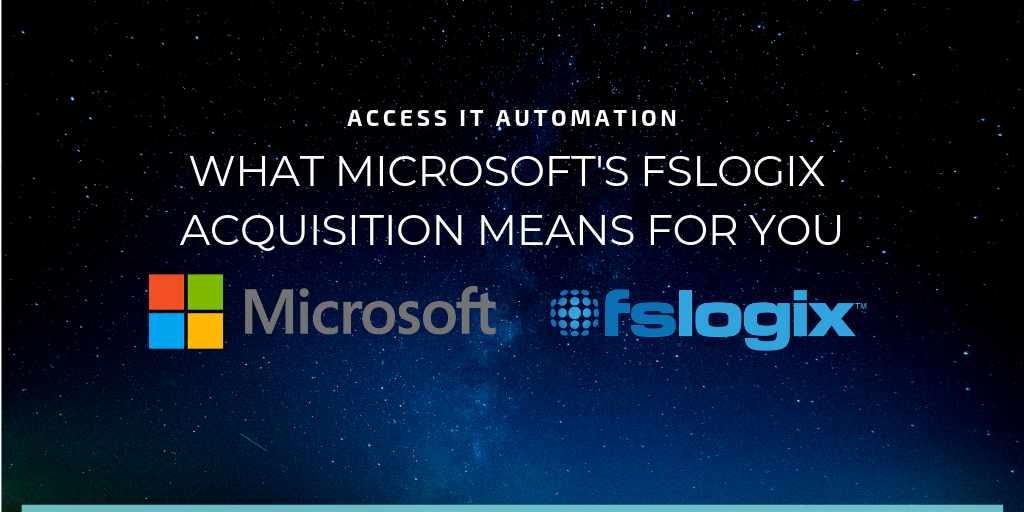On November 19th, 2018, Microsoft announced its acquisition of Atlanta, Georgia-based FSLogix for an undisclosed sum to extend the company’s virtualization capabilities and provide an even better virtualized Windows and Office experience delivered on Microsoft Azure — a mission that the start-up shared since its inception in 2012.
While it isn’t clear yet how the FSLogix team members or products exactly will be merged into the software giant’s organization, the start-up’s CEO Randy Cook said in his statement that “FSLogix will soon integrate with Microsoft and join the strength of its enterprise productivity solutions and global reach.”
(Randy, my congratulations — what an achievement! FSLogix will be an amazing addition to Microsoft.)

FSLogix’s Mission: Deliver The Best Virtualized Windows & Office Experience
FSLogix App, the company’s flagship product, is a software agent that enables virtual desktop administrators to limit the applications, add-ins, folders, and peripheral devices a user sees to those they have permission to see based on predefined security policies. It also significantly reduces the number of Windows Gold images an organization has to create and maintain and helps optimize license costs while assuring compliance.
In addition, the FSLogix Profile Container and Office 365 Container reduce the workload of customers’ network and file servers by up to 80% by storing users’ profile data locally as it’s being used in a so-called “Cloud Cache”. A Cloud Cache acts as an intermediary between the user’s desktop and a remote container storage and can be configured to store containers in more than one location at the same time, on-premises or in the cloud.
Mr. Cook said further in his statement: “Our products have won numerous industry awards and have been broadly adopted by customers around the world. For many of those customers, the immediate value provided by Office 365 Container was simply the introduction to the rest of the FSLogix suite, and we have many customers that consider our software critical to their organizational goals.”
FSLogix products have a sweet spot for organizations with 1,000 to 50,000 users and are compatible with a swath of cloud vendors including Amazon, VMware, Citrix, and Red Hat.
How Will Microsoft Utilize FSLogix Products?
In Microsoft’s announcement of the acquisition, Brad Anderson, CVP, Microsoft 365 and Julia White, CVP, Microsoft Azure said: “FSLogix is a next-generation app-provisioning platform that reduces the resources, time and labor required to support virtualization. From small businesses to very large global enterprises across numerous industries, FSLogix solutions enhance customer experience and productivity, while reducing support requirements for IT departments.”
It isn’t a coincidence that the FSLogix acquisition was made public just weeks after Microsoft’s announcement of its new Windows Virtual Desktop, a cloud-based service that would optimize customers’ Windows 10 experience for Office 365 ProPlus and includes free Windows 7 Extended Security Updates.
“With this acquisition, customers will benefit in a number of ways. Through customer engagement, we know that Microsoft Office applications are some of the most highly used and most commonly virtualized applications in any business. Office 365 ProPlus is currently the best Office experience, and, with FSLogix enabling faster load times for user profiles in Outlook and OneDrive, Office 365 ProPlus will become even more performant in multi-user virtual environments (including Windows Virtual Desktop)”, Anderson and White wrote further.
What This Acquisition Means For You
Most people probably don’t realize how key this acquisition is for Microsoft’s cloud strategy. FSLogix was founded by the original developers of Symantec Workspace Virtualization, or SWV, which was like a layering application deployment, packaging deployment, distribution technology from Symantec.
By snapping up FSLogix, Microsoft enabled themselves to own a stake in the application packaging deployment distribution space that tackles user personalization. FSLogix does application packaging distribution, but it also handles the bits of an application that are sticky to the users themselves, rather than having to be installed locally onto a machine. They roam and follow the user.
In addition, FSLogix has got a virtualization platform that really helps once Microsoft is able to mature MSIx enough for broad enterprise deployment as well as other scenarios that require user stickiness roaming from device to device. Now, they have a mechanism and a way to do that much better than AppV was ever able to. It is possible (although nothing has been made public from both companies) that Microsoft will simply utilize the APIs and the code and bolt them straight into MSIx to give it this instant “umph” to work across.
Conclusion
This acquisition is a massive long-term move for Microsoft that has the potential to bear enormous fruit in the next three to five years. It will be interesting to see how the company will integrate not only the products but also the talent. While it will be probably another six to twelve months before tangible results are visible, it is definitely worth watching out for further details on this move.